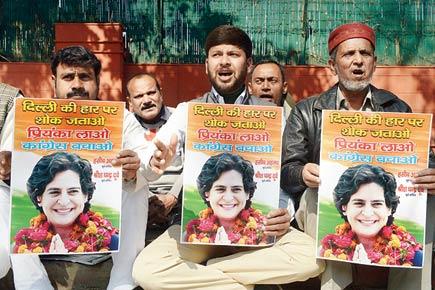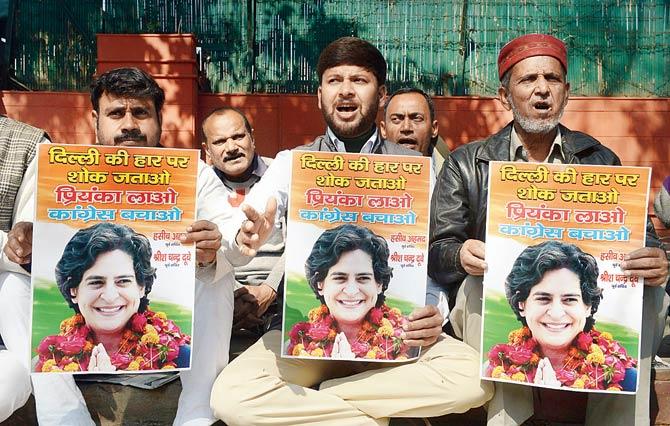As the focus moves to the UP polls, Congress should turn to Priyanka Gandhi, who is a better prospect than her earnest but bumbling brother

 Over the weekend, following the saturation coverage of the results of the five assembly elections I watched a vox.com video about authoritarianism. Political scientists define this as a worldview that values ‘Order’ and ‘Authority’, and that distrusts ‘Outsiders’ and ‘Social Change’. The immediate provocation for Vox to be discussing this was US presidential candidate Donald Trump, but it could be easily apply to many world leaders in democratic systems (Xi Jinping or Vladimir Putin would not count). In India’s context, Prime Minister Narendra Modi obviously appeals to the authoritarian streak in our society, and the growth of this streak can be correlated to the explosive growth of the middle class — which disdains the usual messy democracy and feels that somehow its political ambitions carries more weight than that of the underclass.
Over the weekend, following the saturation coverage of the results of the five assembly elections I watched a vox.com video about authoritarianism. Political scientists define this as a worldview that values ‘Order’ and ‘Authority’, and that distrusts ‘Outsiders’ and ‘Social Change’. The immediate provocation for Vox to be discussing this was US presidential candidate Donald Trump, but it could be easily apply to many world leaders in democratic systems (Xi Jinping or Vladimir Putin would not count). In India’s context, Prime Minister Narendra Modi obviously appeals to the authoritarian streak in our society, and the growth of this streak can be correlated to the explosive growth of the middle class — which disdains the usual messy democracy and feels that somehow its political ambitions carries more weight than that of the underclass.
ADVERTISEMENT

Congress workers hold a demonstration demanding Priyanka replace Rahul Gandhi to ‘save the party’ after the Delhi elections last February. Pic/AFP
The Congress party’s dynasty is the original example of authoritarianism in India. I have distaste for the royal family — when I worked in Chennai, it tried to sue me twice — but after the recent Assembly polls, the post-mortems spewed across the media have been excessive. I also don’t buy the counter-argument that the Congress beat the BJP in terms of Assembly seats or a higher percentage of seats contested, because that statistic masks the differing trajectory of each party. Snide remarks about party vice-president Rahul Gandhi being Modi’s greatest strategist or about Rahul’s incompetence are misplaced. And while the Congress is not vital to Indian democracy — nature abhors a vacuum, so someone or other will occupy the political opposition — it still has a window of opportunity to revive itself before the 2019 general election.
The 2017 Uttar Pradesh Assembly election is less than a year away, and it not only matters to the Congress but also to the BJP, which won 71 of the state’s 80 parliamentary seats; take away even half of that and Modi would be a different PM. The problem for the Congress though is that it has to make an impressive showing if it is going to remain in the game. Unfortunately, Rahul appears too earnest for the job; he hasn’t been an inspiration, no matter how loud the party lackeys may shout; and he lacks the ruthlessness that characterises Modi and his party president Amit Shah. When he tears up proposed legislation, he looks anything but tough. In short, he does not fit the mould of authoritarianism.
Neither does his mother. Sonia Gandhi’s attempts to act tough bring back memories of the Emergency, even though she had nothing to do with it. She went on the offensive during the recent elections but was ineffective: talking about your mother living in Italy while you are ready to die in India only evokes derisive sniggers. It did nothing to galvanise the Congress cadre in Kerala.
Part of the problem is that since May 2014, the dynasty has been on the defensive, and Modi’s aggression towards the family has been precisely to that end. Even the Agusta helicopter scandal noise in Parliament appears aimed at the UP poll. It is clear that Modi has scared the family into pulling its punches.
The Congress party and its first family have been given an opportunity to stop being on the defensive (for this also impacts their leverage with other parties in opposition to the BJP) by consultant Prashant Kishor, when he suggested that Priyanka Gandhi lead the party in UP, possibly as its chief ministerial candidate. Though immediately swatted down by over-zealous lackeys, the suggestion has merit.
Priyanka ought to revisit her grandmother Indira’s years out of power, 1977-1980. Indira Gandhi’s defeat also occasioned Congress obituaries, but she made a historic comeback. If Priyanka has liabilities (her husband Robert Vadra’s land dealings), then so did Indira — the Emergency, her son Sanjay’s extra-Constitutional authority, etc. Though Priyanka has not had the years of political apprenticeship that Indira had under Jawaharlal Nehru, nobody can deny that she shows the same spunk her grandmother did. You could say that Priyanka fits the authoritarianism mould. And thus, she scares Modi.
Priyanka as the UP campaign leader would galvanise both Congress workers and voters. And in the way her mother declined the job of PM in 2004, she could politely decline the offer of the CM’s job if her party won (Rahul would not exit the scene, but remain as a backroom organisational man, a job he’d probably prefer). And then you could say that a contest for 2019 was well and truly on.
But Priyanka and Modi would then represent competing authoritarianism, and who knows if India would be better off for it. If the current US election is a choice of two evils, India is not far behind; and if you look to the states, it’s clear that ours is a land of a thousand authoritarianisms.
Senior journalist Aditya Sinha is a contributor to the recently published anthology House Spirit: Drinking in India. He tweets @autumnshade. Send your feedback to mailbag@mid-day.com
 Subscribe today by clicking the link and stay updated with the latest news!" Click here!
Subscribe today by clicking the link and stay updated with the latest news!" Click here!






